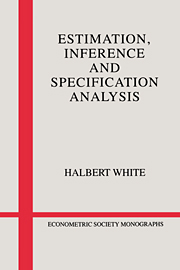Book contents
- Frontmatter
- 1 Introductory Remarks
- 2 Probability Densities, Likelihood Functions and Quasi-Maximum Likelihood Estimators
- 3 Consistency of the QMLE
- 4 Correctly Specified Models of Density
- 5 Correctly Specified Models of Conditional Expectation
- 6 The Asymptotic Distribution of the QMLE and the Information Matrix Equality
- 7 Asymptotic Efficiency
- 8 Hypothesis Testing and Asymptotic Covariance Matrix Estimation
- 9 Specification Testing Via m-Tests
- 10 Applications of m-Testing
- 11 Information Matrix Testing
- 12 Conclusion
- Appendix 1
- Appendix 2
- Appendix 3
- References
- Index
7 - Asymptotic Efficiency
Published online by Cambridge University Press: 05 January 2013
- Frontmatter
- 1 Introductory Remarks
- 2 Probability Densities, Likelihood Functions and Quasi-Maximum Likelihood Estimators
- 3 Consistency of the QMLE
- 4 Correctly Specified Models of Density
- 5 Correctly Specified Models of Conditional Expectation
- 6 The Asymptotic Distribution of the QMLE and the Information Matrix Equality
- 7 Asymptotic Efficiency
- 8 Hypothesis Testing and Asymptotic Covariance Matrix Estimation
- 9 Specification Testing Via m-Tests
- 10 Applications of m-Testing
- 11 Information Matrix Testing
- 12 Conclusion
- Appendix 1
- Appendix 2
- Appendix 3
- References
- Index
Summary
In earlier chapters we have seen that under general conditions the QMLE tends stochastically to θ*, a parameter vector that minimizes the average Kullback-Leibler distance of the specification ft from ht, the conditional density ratio of the dependent variables Yt given the explanatory variables Wt. In Chapter 6, we saw that the QMLE has a normal distribution asymptotically under general conditions, centered at θn* and with a particular covariance matrix.
In many cases, it is possible to construct a variety of such well behaved estimators for some sequence θ* = {θ* *}. (Such estimators may or may not be QMLE's as defined here.) This is essentially always true in situations for which it is possible to construct a model that is correctly specified at least to some extent. Given this possibility, it is important to have some appropriate means of comparing the relative performance of alternative estimators for θ*, and to ask whether there is a way of estimating θ that is "best" in this appropriate sense under specific conditions.
The purpose of this chapter is to address these issues. We first consider asymptotic efficiency for models correctly specified in their entirety, using an approach of Bahadur [1964]. We then consider the relation between efficiency and exogeneity, and efficient estimation using linear exponential models.
- Type
- Chapter
- Information
- Estimation, Inference and Specification Analysis , pp. 130 - 165Publisher: Cambridge University PressPrint publication year: 1994



